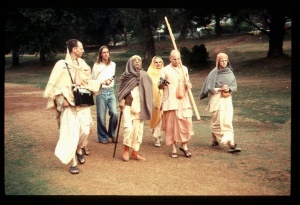CC Antya 16.7 (1975)

A.C. Bhaktivedanta Swami Prabhupada
Below is the 1996 edition text, ready to be substituted with the 1975 one using the compile form.
TEXT 7
- kautukete teṅho yadi pāśaka khelāya
- ’hare kṛṣṇa’ ‘kṛṣṇa’ kari’ pāśaka cālāya
SYNONYMS
kautukete—in jest; teṅho—he; yadi—when; pāśaka khelāya—plays with dice; hare kṛṣṇa—the holy name of the Lord; kṛṣṇa—Kṛṣṇa; kari’—chanting; pāśaka cālāya—throws the dice.
TRANSLATION
When he used to throw dice in jest, he would chant Hare Kṛṣṇa while throwing the dice.
PURPORT
In this connection Śrīla Bhaktisiddhānta Sarasvatī Ṭhākura warns the men of this age not to imitate the jesting of a mahā-bhāgavata like Kālidāsa. If someone imitates him by playing with dice or gambling while chanting the Hare Kṛṣṇa mahā-mantra, he will certainly become a victim of offenses unto the holy name. As it is said, hari-nāma-bale pāpe pravṛtti: one must not commit sinful activities on the strength of chanting the Hare Kṛṣṇa mantra. Playing with dice is certainly gambling, but it is clearly said here that Kālidāsa did this only in jest. A mahā-bhāgavata can do anything, but he never forgets the basic principles. Therefore it is said, tāra vākya, kriyā-mudrā vijñeha nā bujhaya: (CC Madhya 23.39 (1975)) “No one can understand the activities of a pure devotee.” We should not imitate Kālidāsa.